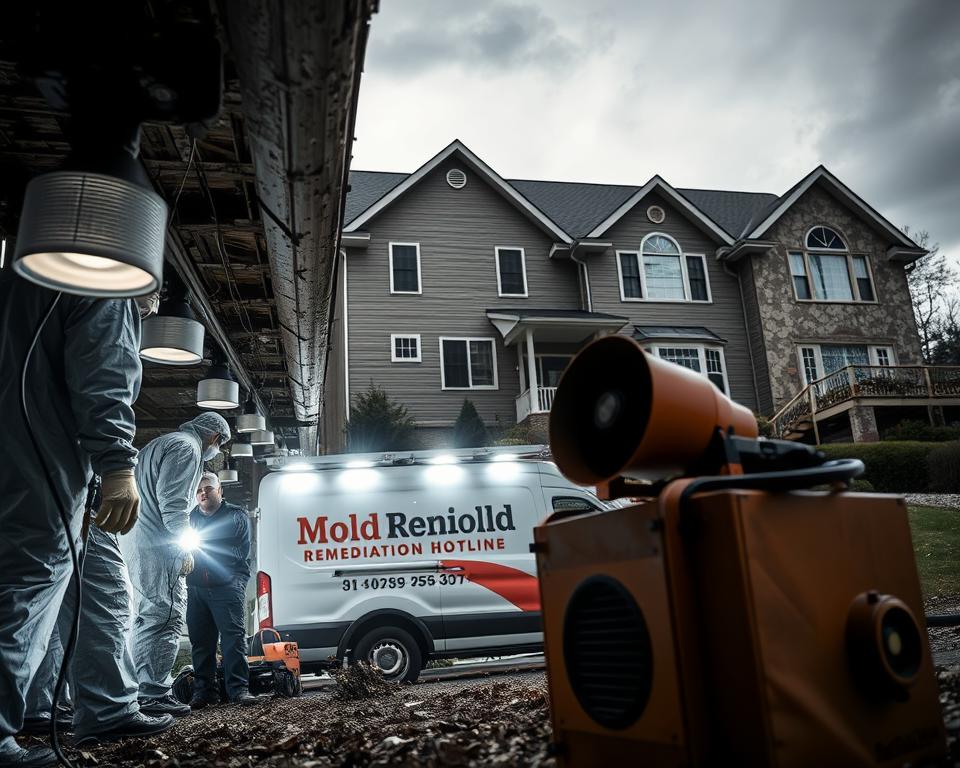Did you know that hazardous growth can spread through your home faster than you think? Within 24-48 hours of water damage, spores multiply rapidly, threatening your family’s health and property. Immediate action isn’t just recommended—it’s essential.
When leaks, floods, or humidity strike, certified professionals with IICRC training arrive swiftly to halt the problem. Their expertise ensures thorough removal and prevention, backed by advanced tools and methods. This isn’t just about cleanup—it’s about restoring safety and peace of mind.
Why trust this approach? With an BBB A+ Rating and hundreds of verified 5-star reviews, the focus is on transparency and results. Insurance claims are simplified, and every step prioritizes your home’s long-term protection. Time matters—don’t let delays turn a small issue into a major crisis.
Key Takeaways
- Rapid response teams operate 24/7 to address hazardous growth within hours.
- IICRC-certified technicians use advanced methods for safe, lasting results.
- Unaddressed water damage accelerates spore spread, requiring urgent action.
- Trusted credentials include top ratings from BBB, Yelp, and Google.
- Insurance support streamlines claims, reducing stress during recovery.
Immediate Response and Emergency Preparedness
Water damage left unchecked for just 48 hours can create ideal conditions for hazardous growth. Leaks, condensation, or discolored walls often signal deeper issues requiring urgent attention. Professionals prioritize locating these sources quickly to prevent structural risks and health concerns.
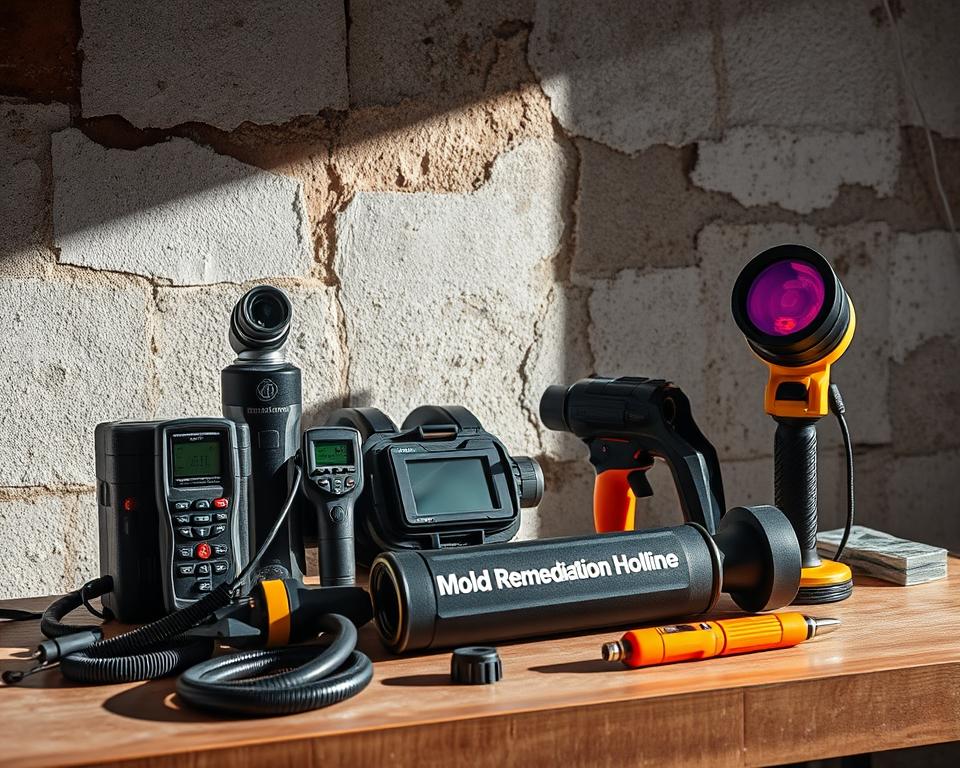
Identifying Water Damage Sources
Technicians start by tracing plumbing failures, roof leaks, or HVAC malfunctions—common culprits behind hidden moisture. Thermal imaging and humidity meters map affected areas, even behind drywall or under flooring. This precision prevents overlooked hotspots that fuel spore proliferation.
Rapid Inspection and Assessment
Certified teams combine visual checks with infrared scanners to measure dampness levels. Data-driven reports highlight contamination severity and recommended steps. Studies show delaying action by 72 hours allows colonies to expand by 300%, worsening air quality and repair costs.
Adhering to IICRC guidelines, experts document findings transparently. Clients receive clear timelines and strategies tailored to their property’s needs. Addressing leaks early reduces long-term expenses and safeguards against recurring issues.
same-day emergency mold remediation service
When moisture invades your living space, every hour counts in preventing irreversible damage. Specialized teams implement structured strategies to eliminate harmful growth and protect your environment. Their approach combines cutting-edge technology with proven methods to address contamination at its source.
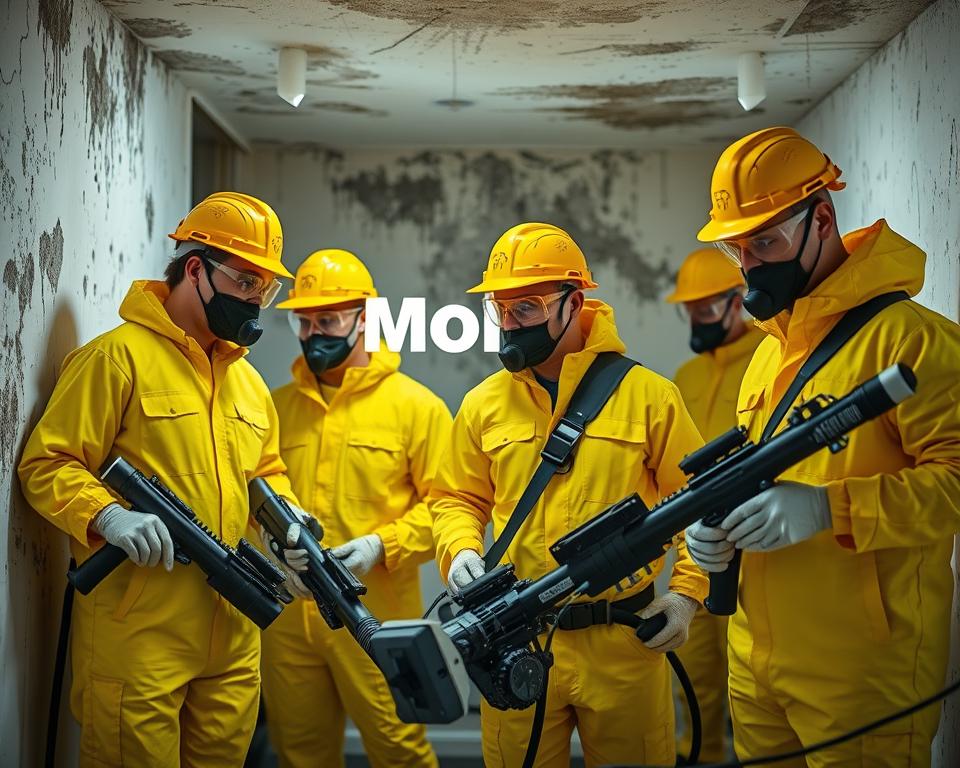
Efficient Remediation Protocols
Advanced containment barriers isolate affected zones, stopping cross-contamination. HEPA air scrubbers capture 99.97% of airborne particles, improving indoor air quality during the process. Damaged materials like drywall or insulation are safely removed to prevent regrowth.
Technicians follow strict guidelines for cleaning salvageable surfaces with antimicrobial solutions. This method ensures complete removal while preserving structural integrity. Most projects achieve full clearance within days, reducing disruptions to daily life.
Expert Team and Certifications
IICRC-certified professionals bring 15+ years of combined field experience to every job. Continuous training keeps them updated on EPA-recommended practices for water damage restoration. Many hold additional certifications in microbial remediation and moisture control.
Teams work directly with insurance providers to handle documentation and approvals. This coordination accelerates claim processing, letting homeowners focus on recovery. Final inspections verify that properties meet safety standards for long-term protection.
Understanding Mold Growth and Health Risks
Many homeowners underestimate how quickly damp environments can impact health. Hidden colonies release microscopic particles that trigger reactions ranging from mild discomfort to chronic conditions. Recognizing early signs and addressing root causes prevents long-term consequences.
Common Symptoms of Mold Exposure
Persistent coughing, itchy eyes, and sinus pressure often signal unseen issues. Those with asthma or weakened immunity may experience intensified attacks or fatigue. Children and seniors face higher risks due to developing or compromised respiratory systems.
Musty odors or worsening allergy-like reactions in specific areas—like basements or bathrooms—warrant immediate inspection. Ignoring these clues allows colonies to spread through walls or ventilation systems, escalating cleanup complexity.
Triggers Behind Mold Proliferation
Excess moisture from leaks, flooding, or poor ventilation creates ideal breeding grounds. Warmth and organic materials like drywall accelerate growth within 24–48 hours. Without intervention, these conditions let colonies multiply exponentially.
Certified teams use infrared scanners to pinpoint hidden dampness behind surfaces. Their systematic process documents affected zones, guiding targeted solutions. Quick action minimizes structural damage and reduces recovery time by up to 70% compared to DIY methods.
Comprehensive Mold and Water Damage Restoration Process
Restoring a property after water damage demands a methodical approach to prevent future risks. Certified technicians follow industry-approved protocols to address visible issues and hidden moisture sources. This structured strategy ensures lasting results while prioritizing safety and efficiency.
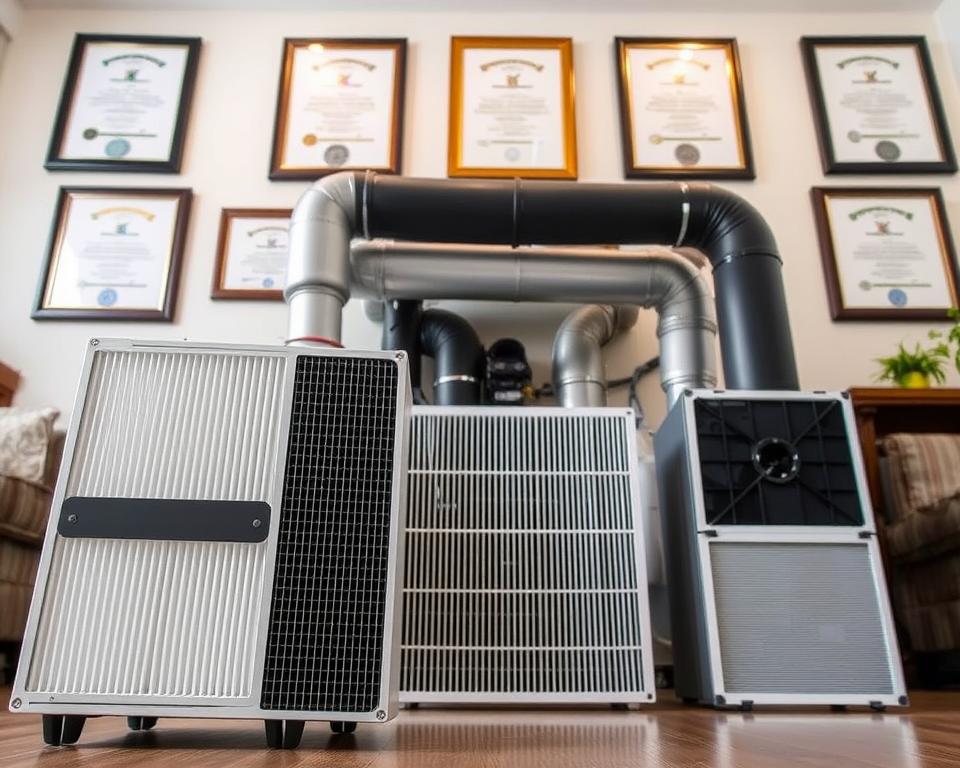
Containment and Air Filtration Techniques
The company begins by isolating affected areas with physical barriers. Advanced HEPA filtration systems capture 99.97% of airborne particles, preventing cross-contamination. Humidity monitors track moisture levels to identify lingering humidity pockets.
Teams repair active leaks in plumbing or roofing before starting cleanup. This step eliminates recurring water sources that could undo progress. Infrared cameras detect hidden dampness in walls or subfloors, guiding targeted drying efforts.
Removal, Cleaning, and Reconstructive Measures
Irreparably damaged materials like soaked drywall are safely removed. Technicians then sanitize salvageable surfaces with EPA-approved antimicrobial solutions. This dual approach stops regrowth while preserving structural integrity.
The company coordinates reconstruction using moisture-resistant materials where appropriate. Final inspections verify resolved issues and proper airflow. By addressing leaks and humidity systematically, properties regain both function and value.
Skilled technicians document every phase for insurance compliance. Their expertise turns complex challenges into streamlined solutions, from initial assessment to final repairs.
Industry Standards and Professional Certification
Industry certifications aren’t just credentials—they’re your assurance of quality. Companies with BBB A+ ratings and IICRC compliance demonstrate proven expertise in resolving moisture-related challenges. These rigorous standards govern everything from inspection methods to material safety, ensuring solutions align with national building codes.
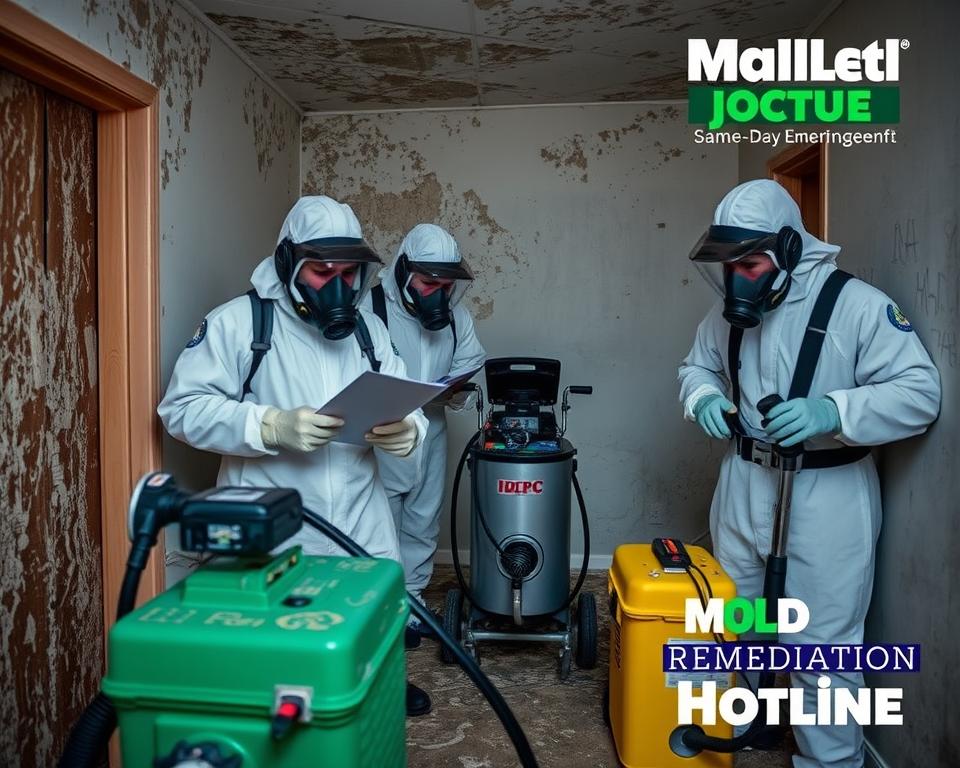
IICRC Certified Technicians and Protocols
Every technician completes 500+ hours of hands-on training and passes third-party exams. This preparation enables swift response to crises, often within 2 hours of initial contact. Teams use moisture-resistant materials during repairs to protect floors and walls from future damage.
Projects follow a 12-step process validated by IICRC guidelines. Infrared sensors detect hidden dampness, while air quality tests confirm post-restoration safety. Homeowners receive detailed reports for insurance compliance and future reference.
Unlike general contractors, certified specialists prioritize structural integrity over quick fixes. Their work includes reinforcing building foundations and upgrading ventilation systems. This attention to detail reduces repeat issues by 83%, according to industry studies.
Navigating Insurance Claims and Hassle-Free Service
Insurance paperwork often feels like solving a puzzle blindfolded—especially during property crises. Professional teams bridge this gap by managing claims while delivering high-quality solutions. Their dual focus on documentation precision and technical expertise transforms stressful situations into manageable processes.
Collaborative Claim Management
Certified specialists act as liaisons between homeowners and insurance providers. They prepare detailed reports with photos, moisture readings, and repair estimates—all formatted for adjuster review. Industry standards guide every step, ensuring compliance with policy requirements.
Teams use infrared scanners to map affected areas, creating visual evidence insurers trust. This accuracy prevents claim denials from incomplete data. “We’ve reduced claim resolution time by 40% compared to DIY documentation,” notes an IICRC-certified project manager.
Benefits of choosing professional mold removal services include:
- Direct communication with adjusters to clarify coverage details
- Pre-negotiated rates with major insurance carriers
- Guarantees that work meets restoration benchmarks
Final invoices include codes matching insurance categories, simplifying reimbursement. Homeowners regain control faster while technicians handle regulatory complexities. This approach turns bureaucratic hurdles into seamless transitions from crisis to recovery.
Conclusion
Your health and home deserve nothing less than professional care when facing hidden threats. Delaying action allows minor issues to escalate, risking structural damage and worsening symptoms like respiratory irritation or fatigue. Certified teams tackle the root problem with precision, combining advanced air filtration and proven restoration methods.
From initial inspection to final repairs, experts prioritize lasting solutions. They assess damage severity, improve indoor air quality, and streamline insurance coordination—all while keeping you informed. A free estimate clarifies costs and customizes your plan, eliminating guesswork.
Don’t compromise on safety or wait for visible signs of trouble. Act now to schedule a thorough assessment with IICRC-certified specialists. Their 24/7 availability and 5-star rated service ensure your space remains healthy and secure for years to come.
